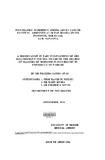| dc.contributor.author | Swai, Praxeda J | |
| dc.date.accessioned | 2013-05-27T07:29:27Z | |
| dc.date.available | 2013-05-27T07:29:27Z | |
| dc.date.issued | 2011 | |
| dc.identifier.citation | Masters of medicine in psychiatry | en |
| dc.identifier.uri | http://erepository.uonbi.ac.ke:8080/xmlui/handle/123456789/26046 | |
| dc.description.abstract | The number of people diagnosed with cancer is increasing each year with 10.9 million
people worldwide being diagnosed with cancer annually. Among these 54% are in
developing countries. Tanzania being one of the developing countries is not
exceptional to the problem
Studies conducted worldwide pertaining psychiatric morbidity in cancer patients have
shown significant psychiatric morbidity in these patients most of which goes
undetected by the medical staff looking after these patients
Many studies have been done globally pertaining psychiatric morbidity among cancer
patients yet no study of this kind has been done in Tanzania in patients with cancer
and hence there was a limited information regarding the situation
Aim: To establish psychiatric morbidity among adult cancer patients admitted at
ORCI, Dar es Salaam Tanzania
Study design: A cross-sectional descriptive study among adult cancer patients
admitted at ORCI who fulfilled the inclusion criteria
Study area: The study was carried out at Ocean Road Cancer institute, Dar es salaam,
Tanzania
Study instruments: Study participants were interviewed using Mini International
Neuropsychiatric Interview (M.I.N.I) and a researcher designed social demographic
and clinical questionnaire
Data analysis: Data was double entered, followed by cleaning and analysis using
SPSS version 16 and inferential analysis. Results are presented in form of tables,
charts, graphs and narratives.
_RESULTS: A total of 150 male and female patients 'participated in the study.
Overall prevalence of psychiatric morbidity based on the MINI criteria was 50.7%
when pain disorder due to general medical condition and psychological factor was
excluded as a psychiatric morbidity (i.e. pain considered as a symptom rather than a
disorder) and 65.3% when pain disorder due to general medical condition and
psychological factor was included as a psychiatric morbidity. The three leading types
of psychiatric morbidities were pain disorder associated with psychological factors
and general medical condition (40.7%) when pain considered as a disorder, suicidality
(38.7%) and major depressive episodes (28.0%). Others include panic disorders
(4.6 %), psychotic disorder (4 %) , antisocial personality disorder 2%, The other less
frequent psychiatric morbidities were Adjustment disorder, dysthymia, (Hypo) Manic
episodes, Obsessive compulsive disorder, Alcohol abuse and dependence with each of
these morbidities affecting less than 1% of the patients
None of these patients with the above psychiatric morbidities had the problem
documented in the clinical file notes. Statistically significant associations were
observed between types of mental disorders and marital status, level of education,
occupation, type of treatment modality, and the presence of severe pain.
Conclusion: Psychiatric morbidity is high among cancer patients and often goes
undetected. This calls for special attention of health care professionals for proper
psychological assessment and management. | en |
| dc.description.sponsorship | University of Nairobi | en |
| dc.language.iso | en | en |
| dc.title | Psychiatric morbidity among adult cancer patients admitted at ocean road cancer institute, Dar es salaam, Tanzania | en |
| dc.type | Thesis | en |
| dc.description.department | a
Department of Psychiatry, University of Nairobi, ; bDepartment of Mental Health, School of Medicine,
Moi University, Eldoret, Kenya | |

